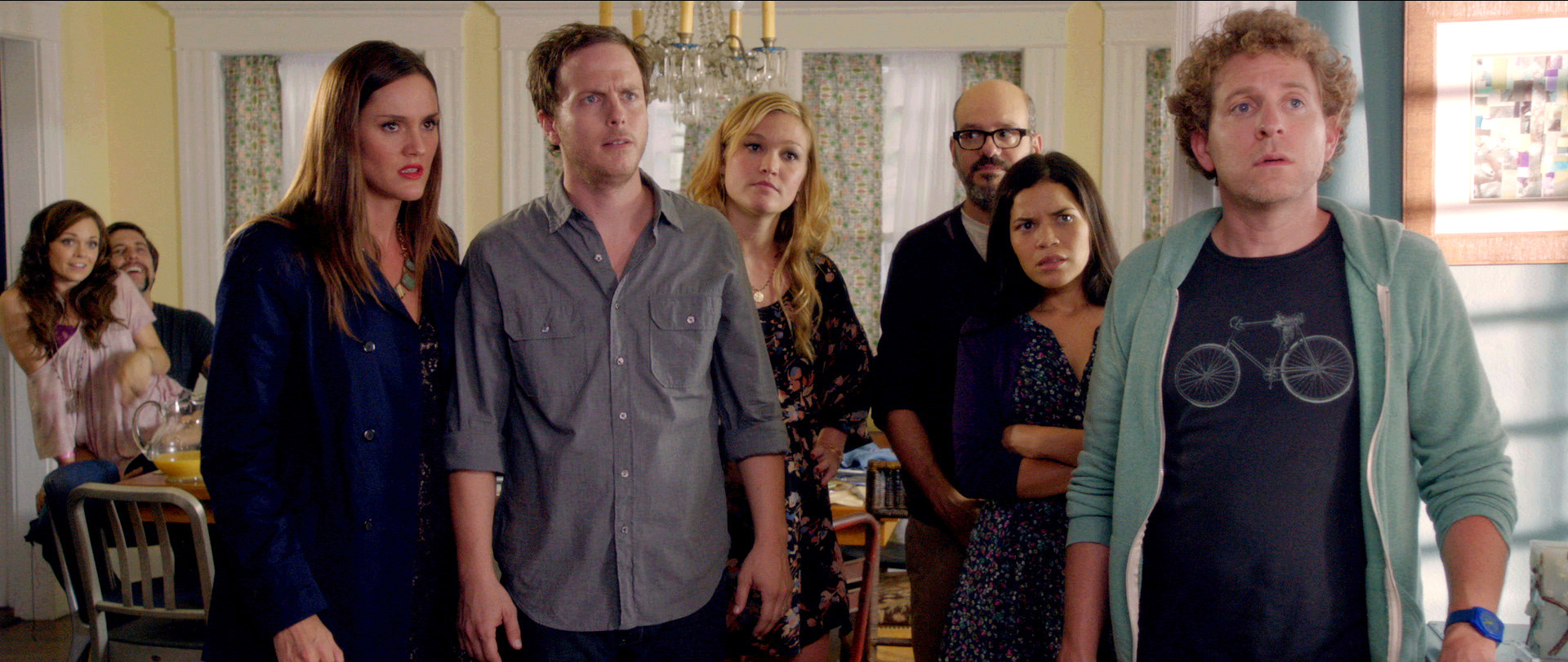At Michael Benjamin Lerner’s tiny house in Georgetown, a Telekinesis poster hangs on the wall, a vase of fresh flowers sits on a side table—a gift to his girlfriend, with whom he shares the house—and the dining-room table is set with glasses of sparkling water and neatly sliced smoked bleu cheese. It’s Valentine’s Day, and Lerner is spending it with the press.
It’s the day before Lerner’s Telekinesis will release its sophomore record, 12 Desperate Straight Lines, on Merge—the label of record for Arcade Fire, who, hours earlier, took home the Grammys’ top prize, Album of the Year. Lerner, 24, Telekinesis’ only consistent member, says that doesn’t necessarily mean the pressure’s on for him.
“Arcade Fire won the Album of the Year because they made the album of the year,” he says, pragmatically. “Telekinesis is probably never going to make a record like that record. I’m not saying that it’s impossible for us to do that. But it’s not like, ‘Oh shit, we have to really step up our game.’ Merge never makes you feel that way. They never make you feel like, since Arcade Fire is selling hundreds of thousands of records, then your band is not important at all. Their whole thing is putting out music that they really, really like. And that’s why they put out Arcade Fire in the first place.”
Despite Telekinesis’ winning pedigree—with former Blood Brother Cody Votolato on guitar alongside ex-Verbow bassist Jason Narducy—and enviable support from Merge, a mainstream breakthrough has remained elusive, with Lines selling a modest 3,000 copies since its release, according to SoundScan.
The music scene’s climate has changed since Death Cab for Cutie signed a major-label deal with Atlantic back in 2004. With the indie sphere’s current appetite for lo-fi scuzz a la Wavves or Best Coast and spaced-out psychedelia like Neon Indian and Toro Y Moi, and even Seattle’s obsession with folk(ish) music, one has to wonder whether there’s still a large market for glossy indie pop like Lerner writes.
Death Cab guitarist Chris Walla, who produced Lines as well as Lerner’s 2009 debut Telekinesis!, doesn’t think prevailing trends will impede his music from resonating with a larger audience. “The commonality of the stuff that’s rising to the top is really great songs. Great song structures. And that’s why Fleet Foxes are doing well, and it’s also why Telekinesis is doing well, and it’s also why LCD Soundsystem did well, and it’s also why Das Racist is doing well,” Walla says. “Anybody who has something that you can touch and you can connect to, and you identify and relate to, that’s where it happens.”
Lerner’s tried the highbrow, avant-garde approach. When he started writing songs for the second record, Lerner says he was determined to write the next OK Computer. “Everything I did sounded shitty,” he says. “Like I would try and write these baroque, giant songs, and it was, like, that’s not me!”
Walla has been a catalyst for Telekinesis’ career since Lerner was just a kid who wanted to be a drummer in a rock band. After hearing some haphazard songs Lerner posted on a MySpace page, Walla produced Telekinesis!, earning it some buzz when he told Stereogum it was his favorite record. This rush of events culminated in major-label interest, and ultimately a deal with Merge.
“I really love how . . . Michael is really straight and direct,” Walla says during a recent phone call. “His melodies are very clear, very concise, and really put together. But then . . . he’s willing to do just about anything. He’s really into experimenting, and I think that that combination of a really classic song sense and melodic sense, plus the sort of ‘Let’s tear it all apart as we record it’ [approach], makes for a really interesting record.”
Lines does, as Lerner admits, have some ’90s-music hallmarks—the dramatic third track, “50 Ways,” flashes back to “Blue Album” Weezer, and the entire record has a slick veneer that indie rock’s lately been abandoning in favor of fuzz and distortion. That bright sound pervades Lines insistently—even though this is Lerner’s version of a breakup album. Lyrically, the album deals with the messy end of the same romance that he hoorah-ed on his first record. Worse, while he was writing the songs, he was dealing with a balance problem in his ear that required multiple hospital visits, and the day before he was scheduled to begin recording the album with Walla, he got into his first car wreck (this was after he had already written Lines‘ first single, “Car Crash.” Ominous?). For the first time in his life, Michael Lerner was depressed.
In typical cheery fashion, Lerner ended up seeing that dark period as a blessing in disguise—after rescheduling his recording session, he wrote some of the album’s best tracks, including the infectiously bouncy single “Please Ask for Help.” His sunny nature turned 12 Desperate Straight Lines into the most chipper breakup album you’ve ever heard. On the album’s opening track, Lerner sings such sullen lines as “I never loved you/I’ve never loved anyone,” but at the same time a guitar strums vividly and a xylophone tinkles a lively, happy melody.
“It’s hard for me to sound really sad,” Lerner admits. “I’m not a sad person at all, and I definitely don’t want to come across as that. I’m a really, really happy guy.”








